Photo
made a blog for my comic
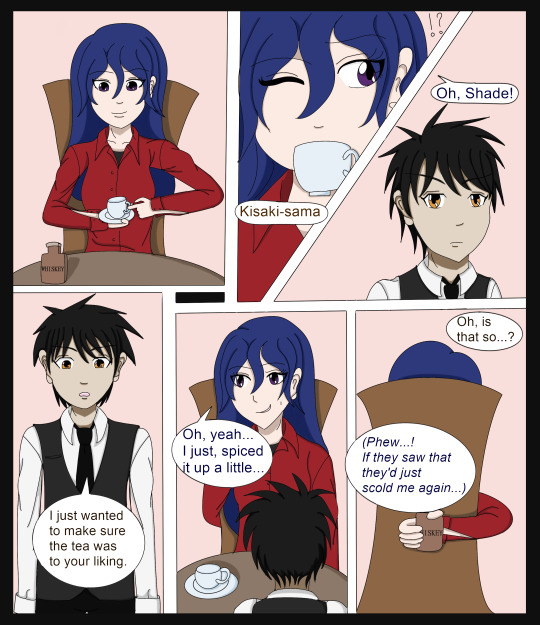
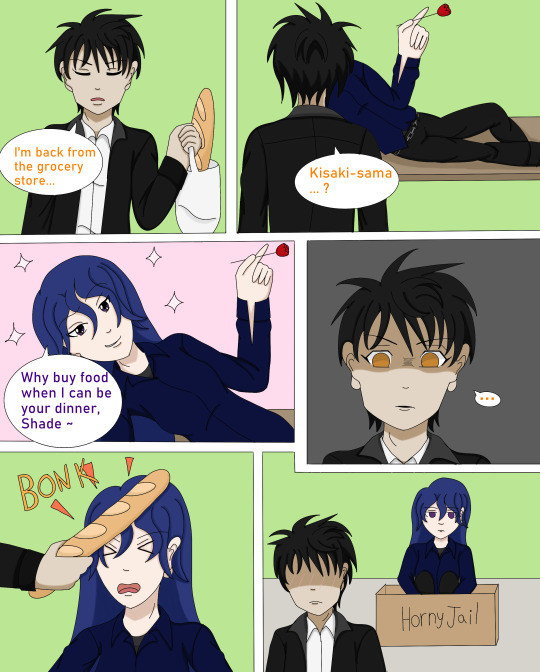

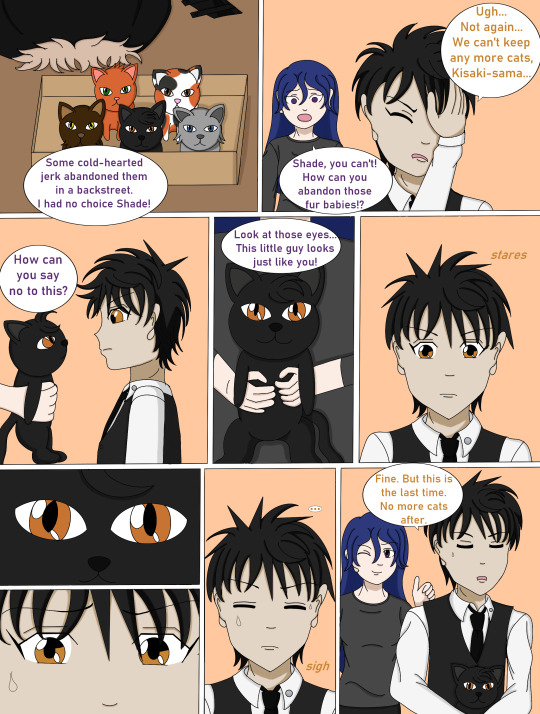


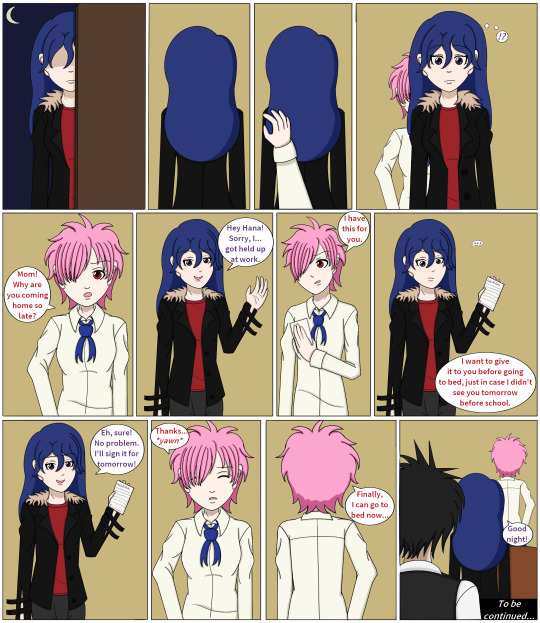
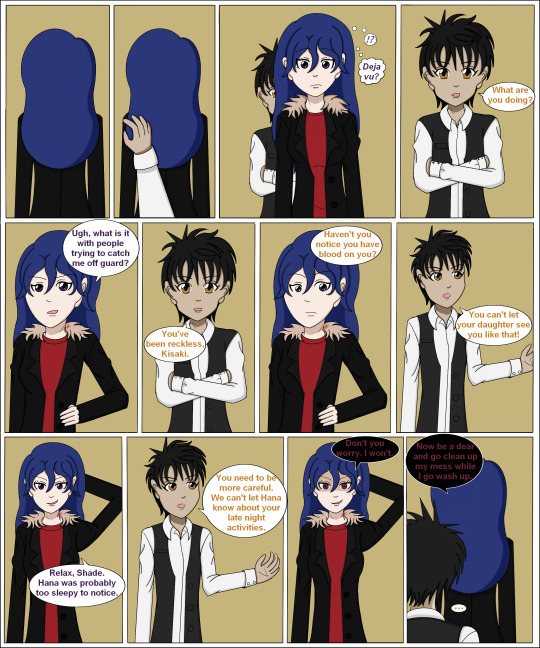
Old comic that I started to draw at least since 2 years ago, with my own original characters Kisaki Silvers and Shade Whiton (and later Hana). The latest pages are from around February 2022. I’d love to continue this story! It started as a simple comedy comic stip but ended up having a more darker tone.
11 notes
·
View notes
Photo

Destiel is canon
In Spanish
(I couldn’t contain my joy and had to draw them)
8 notes
·
View notes
Text
Kilgrave Analysis

I finally finished season 1 of Jessica Jones and I had to make an analysis of this version of the Marvel villain Kilgrave (known as The Purple Man in the comics), real name Kevin Thompson in the tv series, played by David Tennant. Without further ado let’s deep in!
Kilgrave, born Kevin Thompson, developed a severe brain malfunction at a young age and was fated to become brain dead. His parents, both scientists, tried to save him with experimental treatments. But those treatments were extremely painful and even inhumane. We are first introduced to Kilgrave’s backstory through a video of him as a child, seemingly getting abused for the sake of some cruel experiments only by his parents, which are portrayed as “mad scientists”. This revelation may have brought some sympathy to Kilgrave, thinking that he was an abused child brutalized by cruel parents, but we learned later that Kilgrave lied. His parents were actually trying to save him and didn’t abandon him right after. After the experiments cured Kilgrave and gave him his mind control power, they stayed with their child and took responsibility for their actions. Young Kilgrave abused his power on them, mind controlling his parents to satisfy every of his whims, regularly throwing tantrums at them and hurting them. He forced his mother to burn her own face with a stream iron. At some point it was too much for his parents who feared for their safety and they ran away, leaving their son to survive on his own.
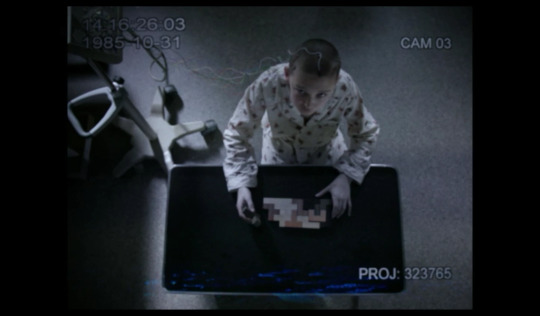
But, even if Kilgrave lied about certain parts of his past, it doesn’t mean his grudge against his parents was unjustified. From his perspective as a young child, his parents were torturing him. The fact they were trying to save his life doesn’t change how painful, frightening and traumatizing the experiments done on him were. We even see him panicking when he sees the video of himself getting abused. It’s normal that he grew resentful of his parents and felt like they didn’t love him and only cared about their work. With his new power, it’s not that surprising that a grudgeful and traumatized kid would have used it to get revenge on his parents, who he viewed as his abusers. And after being actually abandoned by them (although it’s understandable from their perspective), Kilgrave’s grudge only grew stronger, as well as his feeling of not being loved. He was left to survive on his own, using his power to force people to give him shelter and feed him. Honestly, it’s not that surprising that he ended up as a remorseless and unempathetic monster growing up, given his pasts and his power to literally bend anyone to his will. No wonder he ended up as a selfish prick who thinks the world revolves around him, as it literally is from his perspective.
Kilgrave confessed that he never knows when people are just acting upon his words of if their actions are from their own free will. His power most likely isolated him from others and prevented him from creating genuine bonds with others. People are basically just tools for him to satisfy his needs so he stopped seeing them as human beings. He doesn’t care about their feelings, their needs, their pains. Only his needs and feelings matter. This made him callous and remorseless, as well as causing him a serious lack of empathy and complete disregard for human lives.
When Jessica asked him if he does have a conscience or regrets his actions, he said that he does have a conscience, but that his was “selective”. Throughout the series he never showed any consideration for anyone other than himself and at a certain degree, Jessica. So it’s not that Kilgrave is unable to feel empathy, more that he became so desensitized to others’ feelings that he can’t empathize with them anymore. But it’s not impossible for him to feel a certain amount of empathy as shown with Jessica. Though this empathy has limits and he doesn’t seem to have any issues with trying to harm or kill her if it benefits him or on a whim if she enraged him. He did seem intrigued by the idea of becoming a hero, but that was just a way for him to be closer to Jessica and for his own self-satisfaction to have people be genuinely grateful to him, which he never experienced before. It just feeds his narcissistic nature.
Another characteristic of Kilgrave is his complete inability to accept any responsibilities for his actions. He forced people to kill themselves numerous times yet refused to be called a murderer. Even if they had no other choice to obey him and end their lives, he doesn’t accept the blame. He’ll blame them for being an inconvenience to him or say that he just removed nuisances from society. He also forced Hope to kill her parents as a way to get revenge on Jessica, blaming her for their death. He was apparently totally unaware that he was a rapist. When Jessica rightfully confronted him about raping her, he was genuinely shocked. He really didn’t even consider that what he was doing was rape. He denied the accusation, saying that he brought her to nice restaurants and hotels. He refuses the label of murderer and rapist because it would be like admitting his wrongdoings and he can’t. He wants to be seen as a victim and blame others for his actions.
Kilgrave is also a big egomaniac and narcissist. He’s a selfish man who doesn’t take insults against him lightly. The first time we actually saw him, he forced a rather wealthy family to shelter him, not only ordering them to let him in and feed him, but also added that they are “delighted” to have him as a guest. When Trish insulted him on radio he sent someone to kill her and after she apologized live, he was pleased enough to let her live. As mentioned earlier, he was shocked and upset when Jessica called him a rapist, thinking that she should be grateful that he brought her to nice restaurants and hotels. To him, it’s an honour to be with him. He doesn’t accept the slightless disrespect towards him and will make sure the person who dared insulting him will pay. Upon learning about Jessica’s relationship with Luke, Kilgrave felt deeply offended that she chose Luke over him, even accusing Luke of sabotaging his relationship with Jessica.
He also seemed to have abandonment issues. He resents his parents for abandoning him and, according to him, not loving him. This feeling seems to have worsened after meeting Jessica. After Jessica broke from his control and left him to die after being hit by a bus, Kilgrave felt abandoned by her. He grew to resent her and be obsessed with her. He meticulously planned his revenge against her, using Hope to do so and forcing her to kill her own parents to hurt Jessica. When he managed to convince Jessica to live with him in her old house, he grew extremely worried that she might leave him again.
That brings us to Kilgrave and Jessica’s relationship. When he first met her, Kilgrave was attracted to her beauty, but also mainly intrigued by her power. Just like him, she was special. “But underneath it all the power, just like me. Though not quite as good, of course” was what Kilgrave told her. It seemed that for the first time, Kilgrave might have found someone he can relate to, someone similar to him… but, he felt the need to say “not quite as good”, showing his narcissistic side and his incapacity to see someone as a genuine equal. Despite that, we can see that Kilgrave valued Jessica differently than his other victims. He kept her for months as his “lover” (sex slave) and genuinely believed himself to be the perfect gentleman with her. At some point he even didn’t give her any orders for twelve hours, to test her loyalty and if she truly loved him. For him to even consider that, he must be delusional or desperate for Jessica’s love. For someone to actually love him. And given that Jessica is similar to him, he feels like maybe she can accept him. Kilgrave remembered this event in his own twisted reality, thinking that for the 18 seconds Jessica wasn’t under his control, she was acting true to herself, therefore actually loved him. In reality, Jessica actually tried to escape but was too slow. As a punishment, Kilgrave ordered her to cut her own ears: “You never appreciate anything I do for you. If you can’t listen to me you don’t need ears… Cut them off”.
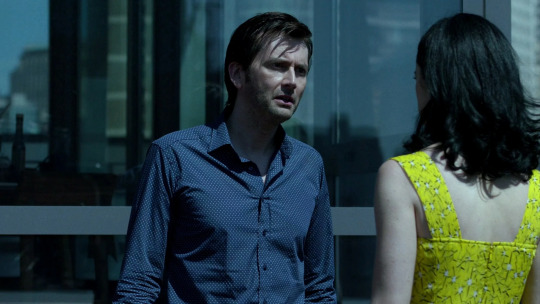
Right when Jessica started to cut her ear, he changed his mind and told her to stop, gently hugging her. Kilgrave never seemed to have changed his mind when he decided to mutilate someone. I wouldn’t say he had guilt, but that he does care a little bit about Jessica. In his mind, he rewrote this memory and convinced himself that Jessica stayed with him and that she loved him. Obviously, it’s important for him to feel that someone loves and stays with him willingly, as he was never able to experience that in his life due to his power.
After Jessica broke from his control he became obsessed to get her back. He felt once again abandoned and unloved. When he finally managed to meet with Jessica again, he confessed her love to her and promised he wouldn’t use his ability on her anymore. He bought back Jessica’s childhood house without forcing the current owner to leave as a sign of good faith. He then made sure that everything is the same as when Jessica was still living there, showing his deep obsession about her. Jessica agreed to go live with him in her old house, but simply to get a confession out of him for the murder of Hope’s parents. Kilgrave is completely delusionned, convinced that he can make Jessica fall in love with him and stay with him willingly with such overconfidence. He still used brainwashed people to make sure Jessica doesn’t try to leave or hurt him and became really worried when Jessica went on a walk, showing again his fear of abandonment.

But we learned later that he didn’t promise to not use his power on Jessica out of sympathy and concern for her, but because he knew his power didn’t work on her anymore. Well, maybe he wasn’t sure, but he had a doubt, and trying to use his power on her and failing would have revealed to Jessica her advantage over him. He had to keep control, so telling her he won’t use his power anymore preserves the illusion of power he has over her and makes him look more sympathetic and in good faith. Obviously, if he was sure he could use his power on her, he would have done it without a second thought.
When Jessica deceived him and kidnapped him, interrogated him, tortured him in order to get a confession, he grew resentful against her. When confronted by his parents, he snapped, telling them how much he felt abandoned. After his mother tried to kill him to stop his rampage, he ordered her to stab herself as many years she had abandoned him, killing her.

He tried to manipulate Jessica, convincing her that she loves him and stayed with him on her own free will when he didn’t use his power for twelve hours, until she revealed to him that she just didn’t have the time to escape. This broke Kilgrave’s delusion that Jessica loved him all along. Feeling unloved and abandoned once again as well as having his massive ego hurt, Kilgrave became angry at Jessica and started trying to kill her. He forced her to watch her crush Luke blow himself up and mind control him to attack her, as well as using his father’s knowledge to make his power stronger in hope he can control Jessica again. He seems to keep changing his mind between killing Jessica or getting her back, showing how impulsive and unstable he can be. He did say his conscience (empathy) is selective, and Jessica seems to be the only one he cared about, and here we can see how easy it is for him to not care anymore if it benefits him. He even said that he would enjoy killing her but still hesitate if he truly wants to kill her, control her, or break her heart.

He eventually tried to use his power once again against Jessica and seemed to have succeeded. Kilgrave thought that Jessica was playing him so he controlled Trish, forced her to kiss him and claim he will make her her slave and rape her everyday to make Jessica react. Much to his surprise, Jessica didn’t move, making him believe that his power worked again on her. He is rejoiced, ordering Jessica to smile for him, which she does. He then told her to not worry and that she’ll come to love him as he loves her, somewhat trying to comfort her and again craving Jessica’s love. But turns out, Jessica wasn’t under his control, she grabbed her neck and out of irony told him to “smile” before she breaks his neck, killing him. His obsession for Jessica and desperate need for her to love him caused his undoing.
Throughout the series, Kilgrave has been referred to as a “psychopath”, a “sociopath” and “psychotic”. Do any of those terms adequately describe him? Well, medias tends to misuse mental illnesses and disorders and throw those terms for any “crazy” murderous villains. Do any of those diagnoses actually fit Kilgrave’s mental state? Quick summary, psychopaths usually refer to someone who is born that way and has a lack of empathy, fear, stress and anxiety due to a thinner amygdala. Psychopathy is considered as a neurodevelopmental disorder, a disorder that affects the development of the nervous system and leads to abnormal brain function. Nowaday it’s often referred to as “primary psychopathy”. “Sociopath” is an outdated term that doesn’t have any medical meaning anymore. It’s more of a pop culture term used for psychopaths, antisocial personality disorders, or just evil characters in general. So let’s forget about that one. I mentioned primary psychopathy, there’s also secondary psychopathy (who is also referred to as sociopathy sometimes). Secondary psychopaths aren’t born that way, they are mold and shaped by their environment, upbringing and possible trauma. While primary psychopathy is characterized by callousness, shallow affect, manipulation, and superficial charm, while secondary psychopathy is associated with impulsivity and lack of long-term goals, and is related to hostile behaviors. They don’t totally lack empathy, their empathy is more “selective” and unstable. Antisocial Personality Disorder is a personality disorder, something that is developed, not innate. ASPD doesn’t equate a violent criminal either but is characterized by a lack of remorse and disregard for others and the law. Not all primary psychopaths have ASPD but all secondary psychopaths do and is often comorbid with borderline personality disorder, which is characterized by abandonment issues and emotional impulsivity and unstability. Both primary and secondary psychopathies are in the spectrum of narcissistic personalities (without necessary being NPD), but not everyone with ASPD is also narcissistic.
Phew. Ok now that I’m done let’s go back to Kilgrave. Let’s cross out primary psychopathy. It’s obvious Kilgrave isn’t born that way and he showed multiple times fear, stress and emotional instability. He was made that way by his environment, upbringing and trauma. I talked before about how narcissistic he was and I do believe he could have NPD. He has a grandiose sense of himself, he viewed himself as special and unique and thus above others, great sense of entitlement, exploitative, lack of empathy and arrogant. He also seems to show signs of ASPD, he fails to obey laws and norms, he’s a lying, deceptive and manipulative person and do so for his own profit or self-amusement, he’s quite impulsive, irritable and aggressive and has a blatant disregard for the safety of others, he can’t take responsibility and lack remorse for his actions. I also mentioned his abandonment issues, how he fears that Jessica will abandon him and how he craves for her love. Those might be related to borderline personality disorder, which is described as: “disturbed sense of identity, frantic efforts to avoid real or imagined abandonment and extreme reactions to such, black and white thinking, impulsivity, intense or uncontrollable emotional reactions that are disproportionate to the event or situation, unstable and chaotic interpersonal relationships, distorted self-image, self-damaging behaviors, dissociation and is often accompanied by depression, anxiety, anger, substance abuse, or rage”.
I do think some of those criteria fits Kilgrave. I think he might have those three personality disorders or partially have them, all in the cluster B and comorbid. That would put him in the category of secondary psychopath. The fact his empathy can be selective and unstable regarding Jessica seems to also point to that conclusion.
I think Kilgrave is a well-written villain, his psychology and psyche is accurately portrayed in the series, even if his behaviours are explained they aren’t justified. He’s not just evil for the sake of being evil, we actually see how he became that way and can understand him. After all, evil is made, not born.
144 notes
·
View notes
Text
Kilgrave Analysis

I finally finished season 1 of Jessica Jones and I had to make an analysis of this version of the Marvel villain Kilgrave (known as The Purple Man in the comics), real name Kevin Thompson in the tv series, played by David Tennant. Without further ado let’s deep in!
Kilgrave, born Kevin Thompson, developed a severe brain malfunction at a young age and was fated to become brain dead. His parents, both scientists, tried to save him with experimental treatments. But those treatments were extremely painful and even inhumane. We are first introduced to Kilgrave’s backstory through a video of him as a child, seemingly getting abused for the sake of some cruel experiments only by his parents, which are portrayed as “mad scientists”. This revelation may have brought some sympathy to Kilgrave, thinking that he was an abused child brutalized by cruel parents, but we learned later that Kilgrave lied. His parents were actually trying to save him and didn’t abandon him right after. After the experiments cured Kilgrave and gave him his mind control power, they stayed with their child and took responsibility for their actions. Young Kilgrave abused his power on them, mind controlling his parents to satisfy every of his whims, regularly throwing tantrums at them and hurting them. He forced his mother to burn her own face with a stream iron. At some point it was too much for his parents who feared for their safety and they ran away, leaving their son to survive on his own.

But, even if Kilgrave lied about certain parts of his past, it doesn’t mean his grudge against his parents was unjustified. From his perspective as a young child, his parents were torturing him. The fact they were trying to save his life doesn’t change how painful, frightening and traumatizing the experiments done on him were. We even see him panicking when he sees the video of himself getting abused. It’s normal that he grew resentful of his parents and felt like they didn’t love him and only cared about their work. With his new power, it’s not that surprising that a grudgeful and traumatized kid would have used it to get revenge on his parents, who he viewed as his abusers. And after being actually abandoned by them (although it’s understandable from their perspective), Kilgrave’s grudge only grew stronger, as well as his feeling of not being loved. He was left to survive on his own, using his power to force people to give him shelter and feed him. Honestly, it’s not that surprising that he ended up as a remorseless and unempathetic monster growing up, given his pasts and his power to literally bend anyone to his will. No wonder he ended up as a selfish prick who thinks the world revolves around him, as it literally is from his perspective.
Kilgrave confessed that he never knows when people are just acting upon his words of if their actions are from their own free will. His power most likely isolated him from others and prevented him from creating genuine bonds with others. People are basically just tools for him to satisfy his needs so he stopped seeing them as human beings. He doesn’t care about their feelings, their needs, their pains. Only his needs and feelings matter. This made him callous and remorseless, as well as causing him a serious lack of empathy and complete disregard for human lives.
When Jessica asked him if he does have a conscience or regrets his actions, he said that he does have a conscience, but that his was “selective”. Throughout the series he never showed any consideration for anyone other than himself and at a certain degree, Jessica. So it’s not that Kilgrave is unable to feel empathy, more that he became so desensitized to others’ feelings that he can’t empathize with them anymore. But it’s not impossible for him to feel a certain amount of empathy as shown with Jessica. Though this empathy has limits and he doesn’t seem to have any issues with trying to harm or kill her if it benefits him or on a whim if she enraged him. He did seem intrigued by the idea of becoming a hero, but that was just a way for him to be closer to Jessica and for his own self-satisfaction to have people be genuinely grateful to him, which he never experienced before. It just feeds his narcissistic nature.
Another characteristic of Kilgrave is his complete inability to accept any responsibilities for his actions. He forced people to kill themselves numerous times yet refused to be called a murderer. Even if they had no other choice to obey him and end their lives, he doesn’t accept the blame. He’ll blame them for being an inconvenience to him or say that he just removed nuisances from society. He also forced Hope to kill her parents as a way to get revenge on Jessica, blaming her for their death. He was apparently totally unaware that he was a rapist. When Jessica rightfully confronted him about raping her, he was genuinely shocked. He really didn’t even consider that what he was doing was rape. He denied the accusation, saying that he brought her to nice restaurants and hotels. He refuses the label of murderer and rapist because it would be like admitting his wrongdoings and he can’t. He wants to be seen as a victim and blame others for his actions.
Kilgrave is also a big egomaniac and narcissist. He’s a selfish man who doesn’t take insults against him lightly. The first time we actually saw him, he forced a rather wealthy family to shelter him, not only ordering them to let him in and feed him, but also added that they are “delighted” to have him as a guest. When Trish insulted him on radio he sent someone to kill her and after she apologized live, he was pleased enough to let her live. As mentioned earlier, he was shocked and upset when Jessica called him a rapist, thinking that she should be grateful that he brought her to nice restaurants and hotels. To him, it’s an honour to be with him. He doesn’t accept the slightless disrespect towards him and will make sure the person who dared insulting him will pay. Upon learning about Jessica’s relationship with Luke, Kilgrave felt deeply offended that she chose Luke over him, even accusing Luke of sabotaging his relationship with Jessica.
He also seemed to have abandonment issues. He resents his parents for abandoning him and, according to him, not loving him. This feeling seems to have worsened after meeting Jessica. After Jessica broke from his control and left him to die after being hit by a bus, Kilgrave felt abandoned by her. He grew to resent her and be obsessed with her. He meticulously planned his revenge against her, using Hope to do so and forcing her to kill her own parents to hurt Jessica. When he managed to convince Jessica to live with him in her old house, he grew extremely worried that she might leave him again.
That brings us to Kilgrave and Jessica's relationship. When he first met her, Kilgrave was attracted to her beauty, but also mainly intrigued by her power. Just like him, she was special. “But underneath it all the power, just like me. Though not quite as good, of course” was what Kilgrave told her. It seemed that for the first time, Kilgrave might have found someone he can relate to, someone similar to him… but, he felt the need to say “not quite as good”, showing his narcissistic side and his incapacity to see someone as a genuine equal. Despite that, we can see that Kilgrave valued Jessica differently than his other victims. He kept her for months as his “lover” (sex slave) and genuinely believed himself to be the perfect gentleman with her. At some point he even didn’t give her any orders for twelve hours, to test her loyalty and if she truly loved him. For him to even consider that, he must be delusional or desperate for Jessica’s love. For someone to actually love him. And given that Jessica is similar to him, he feels like maybe she can accept him. Kilgrave remembered this event in his own twisted reality, thinking that for the 18 seconds Jessica wasn’t under his control, she was acting true to herself, therefore actually loved him. In reality, Jessica actually tried to escape but was too slow. As a punishment, Kilgrave ordered her to cut her own ears: "You never appreciate anything I do for you. If you can't listen to me you don't need ears... Cut them off”.

Right when Jessica started to cut her ear, he changed his mind and told her to stop, gently hugging her. Kilgrave never seemed to have changed his mind when he decided to mutilate someone. I wouldn’t say he had guilt, but that he does care a little bit about Jessica. In his mind, he rewrote this memory and convinced himself that Jessica stayed with him and that she loved him. Obviously, it’s important for him to feel that someone loves and stays with him willingly, as he was never able to experience that in his life due to his power.
After Jessica broke from his control he became obsessed to get her back. He felt once again abandoned and unloved. When he finally managed to meet with Jessica again, he confessed her love to her and promised he wouldn’t use his ability on her anymore. He bought back Jessica’s childhood house without forcing the current owner to leave as a sign of good faith. He then made sure that everything is the same as when Jessica was still living there, showing his deep obsession about her. Jessica agreed to go live with him in her old house, but simply to get a confession out of him for the murder of Hope’s parents. Kilgrave is completely delusionned, convinced that he can make Jessica fall in love with him and stay with him willingly with such overconfidence. He still used brainwashed people to make sure Jessica doesn’t try to leave or hurt him and became really worried when Jessica went on a walk, showing again his fear of abandonment.

But we learned later that he didn’t promise to not use his power on Jessica out of sympathy and concern for her, but because he knew his power didn’t work on her anymore. Well, maybe he wasn’t sure, but he had a doubt, and trying to use his power on her and failing would have revealed to Jessica her advantage over him. He had to keep control, so telling her he won’t use his power anymore preserves the illusion of power he has over her and makes him look more sympathetic and in good faith. Obviously, if he was sure he could use his power on her, he would have done it without a second thought.
When Jessica deceived him and kidnapped him, interrogated him, tortured him in order to get a confession, he grew resentful against her. When confronted by his parents, he snapped, telling them how much he felt abandoned. After his mother tried to kill him to stop his rampage, he ordered her to stab herself as many years she had abandoned him, killing her.

He tried to manipulate Jessica, convincing her that she loves him and stayed with him on her own free will when he didn’t use his power for twelve hours, until she revealed to him that she just didn’t have the time to escape. This broke Kilgrave's delusion that Jessica loved him all along. Feeling unloved and abandoned once again as well as having his massive ego hurt, Kilgrave became angry at Jessica and started trying to kill her. He forced her to watch her crush Luke blow himself up and mind control him to attack her, as well as using his father’s knowledge to make his power stronger in hope he can control Jessica again. He seems to keep changing his mind between killing Jessica or getting her back, showing how impulsive and unstable he can be. He did say his conscience (empathy) is selective, and Jessica seems to be the only one he cared about, and here we can see how easy it is for him to not care anymore if it benefits him. He even said that he would enjoy killing her but still hesitate if he truly wants to kill her, control her, or break her heart.

He eventually tried to use his power once again against Jessica and seemed to have succeeded. Kilgrave thought that Jessica was playing him so he controlled Trish, forced her to kiss him and claim he will make her her slave and rape her everyday to make Jessica react. Much to his surprise, Jessica didn’t move, making him believe that his power worked again on her. He is rejoiced, ordering Jessica to smile for him, which she does. He then told her to not worry and that she’ll come to love him as he loves her, somewhat trying to comfort her and again craving Jessica’s love. But turns out, Jessica wasn’t under his control, she grabbed her neck and out of irony told him to “smile” before she breaks his neck, killing him. His obsession for Jessica and desperate need for her to love him caused his undoing.
Throughout the series, Kilgrave has been referred to as a “psychopath”, a “sociopath” and “psychotic”. Do any of those terms adequately describe him? Well, medias tends to misuse mental illnesses and disorders and throw those terms for any “crazy” murderous villains. Do any of those diagnoses actually fit Kilgrave’s mental state? Quick summary, psychopaths usually refer to someone who is born that way and has a lack of empathy, fear, stress and anxiety due to a thinner amygdala. Psychopathy is considered as a neurodevelopmental disorder, a disorder that affects the development of the nervous system and leads to abnormal brain function. Nowaday it’s often referred to as “primary psychopathy”. “Sociopath” is an outdated term that doesn’t have any medical meaning anymore. It’s more of a pop culture term used for psychopaths, antisocial personality disorders, or just evil characters in general. So let’s forget about that one. I mentioned primary psychopathy, there’s also secondary psychopathy (who is also referred to as sociopathy sometimes). Secondary psychopaths aren’t born that way, they are mold and shaped by their environment, upbringing and possible trauma. While primary psychopathy is characterized by callousness, shallow affect, manipulation, and superficial charm, while secondary psychopathy is associated with impulsivity and lack of long-term goals, and is related to hostile behaviors. They don’t totally lack empathy, their empathy is more “selective” and unstable. Antisocial Personality Disorder is a personality disorder, something that is developed, not innate. ASPD doesn’t equate a violent criminal either but is characterized by a lack of remorse and disregard for others and the law. Not all primary psychopaths have ASPD but all secondary psychopaths do and is often comorbid with borderline personality disorder, which is characterized by abandonment issues and emotional impulsivity and unstability. Both primary and secondary psychopathies are in the spectrum of narcissistic personalities (without necessary being NPD), but not everyone with ASPD is also narcissistic.
Phew. Ok now that I’m done let’s go back to Kilgrave. Let’s cross out primary psychopathy. It’s obvious Kilgrave isn’t born that way and he showed multiple times fear, stress and emotional instability. He was made that way by his environment, upbringing and trauma. I talked before about how narcissistic he was and I do believe he could have NPD. He has a grandiose sense of himself, he viewed himself as special and unique and thus above others, great sense of entitlement, exploitative, lack of empathy and arrogant. He also seems to show signs of ASPD, he fails to obey laws and norms, he’s a lying, deceptive and manipulative person and do so for his own profit or self-amusement, he’s quite impulsive, irritable and aggressive and has a blatant disregard for the safety of others, he can’t take responsibility and lack remorse for his actions. I also mentioned his abandonment issues, how he fears that Jessica will abandon him and how he craves for her love. Those might be related to borderline personality disorder, which is described as: “disturbed sense of identity, frantic efforts to avoid real or imagined abandonment and extreme reactions to such, black and white thinking, impulsivity, intense or uncontrollable emotional reactions that are disproportionate to the event or situation, unstable and chaotic interpersonal relationships, distorted self-image, self-damaging behaviors, dissociation and is often accompanied by depression, anxiety, anger, substance abuse, or rage”.
I do think some of those criteria fits Kilgrave. I think he might have those three personality disorders or partially have them, all in the cluster B and comorbid. That would put him in the category of secondary psychopath. The fact his empathy can be selective and unstable regarding Jessica seems to also point to that conclusion.
I think Kilgrave is a well-written villain, his psychology and psyche is accurately portrayed in the series, even if his behaviours are explained they aren’t justified. He’s not just evil for the sake of being evil, we actually see how he became that way and can understand him. After all, evil is made, not born.
#jessica jones#marvel's jessica jones#kilgrave#the purple man#killgrave#kevin thompson#analysis#psychopathy#sociopathy
144 notes
·
View notes
Text
Akemi Homura is NOT a psychopath
I actually didn’t thought I had to ever say that, but, Akemi Homura (Mahou Shoujo Madoka Magica) isn’t a psychopath. She doesn’t have antisocial personality disorder either. Some people love to say she doesn’t care about anyone other than Madoka and is a selfish, callous and abusive person (which aren’t even ASPD traits to begin with). It easy to judge her entire character from the anime only (and the rebellion movie) and completely ignoring the fact that the anime is basically her 100th time loops trying to save her friend (after seeing said friend dying in a horrible way in all previous timelines). So it means she went through a whole 12 years of total misery failing constantly to save her friend. And even in the anime, approximately her 100th time loop, it’s not even true that she only cared about Madoka. She seemed genuinely upset when Mami died and did try to save Sayaka. Of course, her priority will always be Madoka, but when you fell to save everyone after 100 times, who could blame her to focus on the most important person to her? If anything, the girl has serious trauma (or even PTSD).
Damn I could make an entire essay on the matter but I’m tired and sick and honestly, the claim is just too dumb to even bother with it. I’m not saying Homura did nothing wrong and is a great person, she did fucked up thing, but that does not mean she’s a psychopath.
19 notes
·
View notes
Text
So a terf reblogged one of my post. I just want to make it clear that this blog do NOT welcome any time of bigots, either racists, homophobic, sexist, transphobic, etc. If you are a bigot, get the fuck out of my blog.
29 notes
·
View notes
Text
AnR: a study of psychopathy and antisocial personality disorder
Hey there! So here’s another analysis, not about a specific character, but AnR characters that would fit the psychopath/sociopath/antisocial personality disorder/conduct disorder. Those who are familiar with my other analysis would probably guess that I’ll be talking about Otoya. But I also referred to Nio and Hitsugi as sociopaths in previous analysis. I want to correct certain things I may have said that was incorrect as well as used more recent discovery I made about those disorders. I also want to include another character I didn’t really talk about regarding psychopathy/ASPD: Yuri Meichi. Without further ado, let’s take a look at those four characters and if weather or not they fit the diagnosis.
First I’ll explain the different distinction between the different conditions based on my understanding of those:
Primary Psychopathy: Most commonly referred as psychopathy. When specialists talk about psychopaths, most of the time they mean those who have primary psychopathy. Primary psychopathy is innate, meaning that primary psychopaths are born that way. Primary psychopathy is characterized by callousness, shallow affect, manipulation, and superficial charm. Not all primary psychopaths have antisocial personality disorder. They all have certain narcissistic traits (such as grandiose) but again, not all primary psychopaths could be diagnosed with narcissistic personality disorder either. Primary psychopaths have a defecting empathy, meaning that they can’t and will never feel empathy. They are usually viewed as high-functioning.
Secondary psychopathy: Usually referred to as sociopathy, even tho the term sociopath is outdated. Secondary psychopaths are made, they have been mold that way by their environment and possible trauma. Secondary psychopathy is associated with impulsivity and lack of long-term goals, and is related to hostile behaviors. Unlike primary psychopaths, secondary psychopaths are often emotionally unstable and can experience guilt and empathy. Their empathy isn’t defective but instead dysfunctional. All secondary psychopaths meet the criteria for antisocial personality disorder and they are more likely to also have borderline personality disorder. They are also more likely to be low-functioning.
Antisocial Personality Disorder: Also often used as a synonyme of sociopathy. The criteria are failure to obey laws and norms, lying, deception, and manipulation for profit or self-amusement, impulsive behavior, irritability and aggression, blatantly disregards the safety of self and others, a pattern of irresponsibility and lack of remorse. The person needs to be at least 18, have conduct behavior before 15 and the antisocial behaviors aren’t related to schizophrenia or bipolar disorder. People with ASPD can feel empathy and love towards those they bond with and their level of functioning depends of their IQ, education and environment.
Conduct Disorder: Considered the precursor of ASPD. Conduct disorder is characterized by antisocial behaviors in children and teenagers. The causes can be diverse, such as genetic, environment or even a low IQ. The signs of conduct disorder are bullying, aggressiveness, use of weapons, cruelty (towards humans or animals), stealing, forced sexual activities, vandalism, deceptiveness and serious rule violation. Whether those issues are treated or not can determine if those antisocial behaviors will continue in adulthood (and become ASPD) or not.
In this analysis, I’ll refer to primary psychopathy as PP, secondary psychopathy as SP, antisocial personality disorder as ASPD, conduct disorder as CD and narcissistic personality disorder as NPD.
In two of my recent posts I mentioned something Minakata said in KnR Room 4: “Recognizing that Otoya is an intrinsic psychopath and that Hitsugi is an acquired psychopath due to the environment and breeding.”
To me, there was no doubt that Otoya is a psychopath (PP). Minakata confirmed that Otoya is born that way therefore, she’s a primary psychopath. Then for Hitsugi, in her analysis I interpret the acquired psychopath as secondary psychopathy. And when I made the analysis, I thought that SP = ASPD and refer to Hitsugi as a sociopath, but given what I learned recently it might have been incorrect.
So, Minakata wrote psychopath “サイコパス” (saikopasu), which is based on the English word, therefore an anglicism. It sounds more like the pop-culture term instead of the medical term, which is 精神病質 (seishinbyō-shitsu). Therefore, I can be 100% that Minakata used the term psychopath in the medical sense and instead may just be a catch-all term for PP/PS/ASPD/CD. So, “acquired psychopath” doesn’t necessarily mean “secondary psychopath” but rather that Hitsugi acquire traits that are often associated with the whole psychopathy/ASPD spectrum. But, I firmly believe that “intrinsic psychopath” means “primary psychopath” since it’s the only condition among the spectrum who is innate.
So now that I correct that, let’s analyse the said characters and see if they fit any of those diagnosis.
Otoya, Hitsugi and Nio would all technically fit the CD diagnosis. They tend to be bullies, aggressive, use weapons (granted they are assassins but still), cruel, forced sexual activities (for Otoya, may or may not be applicable to Hitsugi), they are extremely deceptive and do violate rules. All of those behaviors are way more serious than a regular teenager rebellion and does harm others. But, even if they could all be diagnosed with CD (given that they are all underage) those three are all different and will probably have different diagnosis as they grow older. So let’s analyse them separately.
I’ll start with the easiest, Otoya. As I said, we know Otoya is born that way, therefore a PP. But just to be sure, let check if she does fit the criteria:
Callousness: I think it’s pretty obvious that Otoya has no sympathy or empathy for anyone and a total disregard for others. She’s insensitive and has no issues with abusing, torturing and killing people.
Shallow affect: This one mean shallow emotions. It doesn’t mean a lack of emotions, just that the emotional responses are low. I’m gonna base it on the manga version and say that despite Otoya’s cheerful attitude, she’s pretty emotionally shallow. Her cheerfulness is just an act. We can see after she failed and during KnR 5 that she’s actually quite cold.
Manipulation: Manipulation is basically Otoya’s middle name. All she does in the series is deceive, lie and manipulate to achieve her goals and simply for her personal pleasure. It’s as natural as breathing to her.
Superficial charm: I’d say Otoya is rather charismatic, she can easily charm people and gain their trust, but we know it’s not sincere. She’s smooth, engaging, charming, slick and voluble.
Otoya also have a defective empathy. You can’t possibly have empathy and commit all the atrocities she did, and she also show no remorse for her actions. She’s incapable of feeling those emotions. PP are born with a thinner amygdala, which is responsible for empathy, stress and fear. Her brain is incapable to feel empathy and remorse and never will.
But, Otoya’s actions show that she might not only be a PP. Otoya is a sadist who feel sexual pleasure from torturing and killing women. I don’t think we will argue if I say that she probably have sadistic personality disorder and sexual sadism disorder, as well as erotophonophilia (paraphilia of sexual arousal and gratification from the death of a human being, also known as lust murder). Those are not always linked to PP. In fact, unlike what people think, PP are rarely killers or even sadist, most of them are high-functioning and have normal jobs and aren’t committing any crimes. But, it’s true that most serial killers were either psychopaths or have ASPD, or both.
As I said earlier, Otoya would probably be diagnosed with CD. CD isn’t necessary to be a PP but it is for the ASPD diagnosis, meaning that in addition of being a PP, Otoya also have ASPD (well, technically she’s 16 so she couldn’t be officially diagnosis, but it’s safe to assume her behaviors won’t change at this point). At the very least, we can say that Otoya is antisocial, and PP and ASPD are often comorbid. Let’s see if she fits the criteria of ASPD:
Failure to obey laws and norms: I mean… she’s a goddamn serial killer who kills for sexual pleasure.
Lying, deception, and manipulation for profit or self-amusement: This is a trait that overlap with PP. I already explained her manipulative nature.
Impulsive behavior: This one may seems to contradict the shallow emotions. Impulsive means making reckless decision or spontaneous decision. It means that if she has a sudden desire, she may not resist it. Impulsive isn’t a synonym of hot-headed (being easily or constantly mad). You can have low emotions and still be impulsive. So yes, Otoya is rather impulsive, she tends to make decision on a whim without thinking of consequences.
Irritability and aggression: Again, even if someone is emotionally shallow doesn’t mean they have zero emotions. With the right trigger, even someone cold can get irritated and aggressive. In Otoya’s case, she can be quite aggressive if someone interrupt her when she’s having “fun” (aka torturing and killing) as we saw when Tokaku saved Haru from her.
Blatantly disregards the safety of self and others: In the manga Otoya was getting her ass kicked by Tokaku yet she continued to laugh and enjoy herself despite her injuries. The girl doesn’t care about her own safety and given her occupation, she doesn’t care about others’ safety either.
A pattern of irresponsibility: Otoya went overboard with killing and ended up attractive the attention of a detective, reason why she joined Class Black. Instead of recognizing that what she’s doing is wrong, she blames the detective for ruining her fun and literally want a serial killer insurance so she’ll never have to get into trouble for killing. I think it’s a form of irresponsibility, instead of fixing her behaviors or at least be more careful, she prefers to just have someone to clean up her mess forever.
Lack of remorse: Another trait that overlap with PP. I don’t think I need to explain this one again.
So in conclusion, Otoya is born a psychopath, but acquired antisocial behaviours due to her environment as well as sadism. Her natural lack of empathy probably make those easier to acquire. Otoya will never genuinely change as a person, she may change her behaviour to get what she wants but she will always the same. Right now, she would be diagnosed with PP and CD, but it makes no doubt that when she’ll be 18 she would be diagnosed with ASPD. So my final diagnosis: Antisocial Primary Psychopath.
Then, we have Hitsugi. So let’s throw the PP out of the possibility since we know she isn’t born that way and was mold by her environment. I would also discard SP given that Hitsugi seems pretty high-functioning as a person. SP tend to be anxious, fearful, hostile and emotionally unstable and it doesn’t seem to be the case with Hitsugi. On the contrary, Hitsugi said that she doesn’t feel much, showing that she does have shallow emotions (not a lack of emotions, mind you). As I said earlier, Hitsugi would most likely be diagnosed with CD. Hitsugi has no problem with hurting and killing people if it suits her or even just for curiosity and she didn’t feel any remorse for that. She’s deceptive, manipulative and a pathological liar. Regarding the forced sexual activities I mentioned earlier, I’m not saying that Hitsugi is a rapist or a sexual predator like Otoya seems to be. I meant it in a way that Hitsugi seems somewhat forceful and assertive when it comes to intimacy, kissing Chitaru even if the latter may not fully consent or be comfortable with it (I’m mainly referencing their second kiss after Chitaru learned the truth and was distressed, it was, in my opinion, inappropriate for Hitsugi to kiss her and seemed like she was taking advantage of Chitaru’s vulnerability).
It’s true, however, that Hitsugi loves and feel regrets for hurting Chitaru, but that’s because she bond with her. Hitsugi doesn’t feel remorse for any other people than Chitaru. Also, it’s true that Hitsugi shows signs of low-self esteem, which is not mutually exclusive with CD. In fact, from what I read, it’s common. I suppose that those with CD who grow up to have ASPD eventually lose their low self-esteem, but Hitsugi is still young.
We don’t know exactly Hitsugi’s past but we can assume that she was brought into the assassination business at a young age and that she eventually lost her capacity to have empathy and started to feel empty. But, thanks to Chitaru, in a way, Hitsugi was able to reconnect with her lost feelings and there may be some hope for her to outgrow her CD and not develop ASPD. But, if Hitsugi never met Chitaru or met her as an adult, there’s no doubt in my mind that she would have ASPD (but not be a SP).
So in conclusion, Hitsugi isn’t born like that, she was mold by her environment, and she does exhibit a lot of antisocial behaviours. So my final diagnosis: Conduct Disorder with chances of antisocial tendencies in adulthood.
Now let’s analyse Nio. In my analysis of her I did say she may have ASPD, but I clarified that given her age she would rather be diagnosed with CD. Nio is unlikely to have PP given that she’s capable of bonding and feeling genuine love. So, when she’ll be 18, would she still be more likely to have regular ASPD or SP?
First, let’s see if she does fit the ASPD criteria:
Failure to obey laws and norms: Even if Nio is following Yuri’s orders, she doesn’t seem to be someone who follow rules in general or the law. She doesn’t listen to her teacher and did broke the Clack Rules (she tried to kill Haru without sending a notice). I don’t have much example for this one.
Lying, deception, and manipulation for profit or self-amusement: Nio’s whole character is about deception. She acts all cheerful, enthusiastic and friendly while truly she doesn’t care about others, she even said she hate them, and enjoy seeing them fail and suffer. She did lied several time and manipulated Haru, all of this mainly for profit or just for fun.
Impulsive behavior: I wouldn’t say Nio is particularly impulsive nor do I really have example, except maybe her decision to kill Haru.
Irritability and aggression: Even if Nio acts friendly, she clearly stated hating all her classmates and got pretty angry with Haru at the end, probably because she was tired of pretending.
Blatantly disregards the safety of self and others: Nio did choose to fight Tokaku one on one even tho Tokaku is a much better fighter. Nio is ready to take risks. She doesn’t care about others’ safety as she gladly accepted to let Haruki try to commit suicide to win (with a huge grin on her face).
A pattern of irresponsibility: Not much instance in the series except in her flashbacks where we see she was a really undisciplined child. We can assume that even if she used to be irresponsible, with Yuri’s strict education it wouldn’t weird if Nio lost this trait over time.
Lack of remorse: Nio never showed genuine sympathy or empathy towards anyone (except Yuri) and doesn’t seem to have any remorse for any of her actions.
She fits most of them but not perfectly. But as I said, ASPD can only be diagnosed as an adult and Nio is only 15. So it’s possible that she might not have developed fully all the ASPD traits. To me, given that she’ll remain with Yuri, who basically abused her as a kid and groomed her, it’s unlikely that she will change. She’ll most likely have ASPD in adulthood. And, given that her relationship with Yuri is unhealthy, there’s a chance that she might end up more emotionally unstable. Abusive relationship on long-term have terrible effect on one psyche. So to me, Nio eventually turning to a secondary psychopath would be a high possibility.
The differences between Nio and Hitsugi regarding their respective relationship is that even if ChitaHitsu is also toxic, the abusive one is Hitsugi, not her partner. So there’s a chance that thanks to Chitaru’s influence she might change and outgrow her CD. Nio on the other end is the victim, Yuri being the abusive one. If Nio grows while still being affected by Yuri’s abuse she’s unlikely to get better.
In conclusion, Nio currently has CD and will most likely have ASPD as an adult as well as SP. She’s not born that way and was mold by her environment and Yuri’s abuse. My final diagnosis: Conduct Disorder with future Antisocial Personality Disorder and possible Secondary Psychopathy.
And now, last but not least, Yuri Meichi. Now you might remember that in my last psychopaths/sociopaths anime characters list I said that Yuri was either a psychopath or a high-functioning sociopath. Well, let’s break it down.
Yuri being an adult I won’t mention CD for her. So let see if she’s born that way or mold by comparing PP and SP criterial. Callousness? Yuri doesn’t seem to care about anyone and is pretty insensitive to others pain. Shallow affect? Well, Yuri is pretty emotionally shallow. She barely show any emotion except what appears to be mild-interest. Throughout the entire series she almost only smile calmly, even while beating up a kid. She’s a calm and cold person. Manipulation? There isn’t much instances that show if Yuri is manipulative, but we did see that she manipulate Nio as a kid and basically groomed her. Superficial charm? Yuri is quite charismatic. She can be smooth, engaging, charming, slick and voluble and we know it isn’t sincere.
What about the SP traits? Impulsivity and lack of long-term goals? Yuri pretty much succeeded in life and is one of the most powerful person in the world who is always calm and rational. Hostile behaviors? Yuri can be intimidating as a person, but she isn’t acting in a hostile and aggressive way.
So it doesn’t seem that Yuri have SP and is more likely to have PP, therefore be born that way. But could she also have ASPD? Let’s see.
Failure to obey laws and norms: Yuri makes me think she’s lawful evil. She makes the law.
Lying, deception, and manipulation for profit or self-amusement: She does that, but it’s also a trait that overlap with PP.
Impulsive behavior: Nope.
Irritability and aggression: Nope.
Blatantly disregards the safety of self and others: Disregards for others perhaps, even thought she didn’t let the injured assassins dies (yet let countless people die for the clan).
A pattern of irresponsibility: Not really
Lack of remorse: Yes, but again, it overlap with PP.
So it seems that all the ASPD traits Yuri has are also PP traits. So therefore, I don’t think she would qualify as having ASPD. And given that she’s 30 now, she’s unlikely to change.
So in conclusion, Yuri is most likely born that way. My final diagnosis: Primary Psychopathy
Phew, that was long. So, among the four characters I analysed, they are all at different places on the spectrum. Here’s a good diagram to illustrate it. I’ll show on it where the characters are or will be in a couple of years:

Thanks for reading, if you have any comments or questions feel free to ask me and see you next time!
#psychopathy#sociopathy#antisocial personality disorder#conduct disorder#narcissistic personality disorder#bordeline personality disorder#akuma no riddle
42 notes
·
View notes
Text
Alina Gray analysis
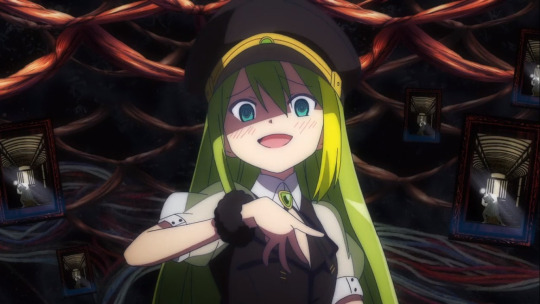
Well then, Alina Gray sure is a piece of work. The problematic fav of the MagiReco fandom, fondly referred to as psycho artist or JoJo reference. But Alina is more than a reference and more than just a psycho. In fact, is she even a psycho? In that case, psycho meaning either psychotic or psychopath (or I guess here psycho as in crazy murderous bitch). So let’s have a meaningful analysis of this character and undercover what might be a tragic tale of objectification.
We are introduced to Alina in the game in chapter 5 and in the anime in episode 9. In both media she arrives to stop the protagonists from destroying Ai, an uwasa. In the game, Madoka and Homura (Moemura) were there but not in the anime version. In the game, in her first appearance Alina appeared at first as serious, cold and irritable, before she revealed her mad and sadistic antics. In the anime, she showed up laughing maniacally, acting all eccentric and borderline insane, even strangling herself. It seems that the anime went overboard with the Alina acting crazy part. Not that I disliked it, but given that the game is the original source, I’ll keep this analysis mainly game-only.
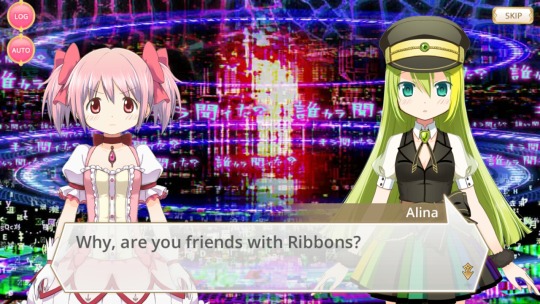

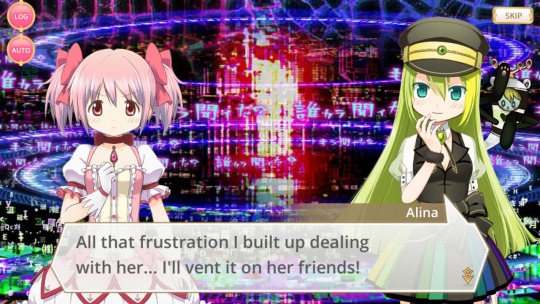

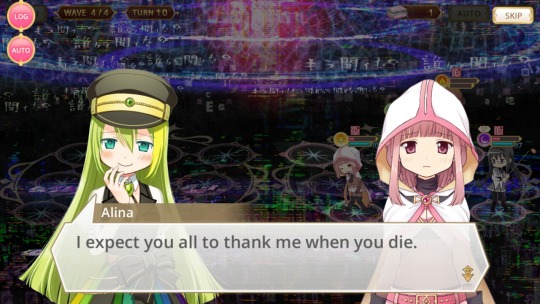
We should start by the beginning, which is Alina’s backstory as shown in her magical girl story. It’s implied that Alina’s fascination with life and death in her art started when her grandparents and dog died when she was a child. Given that this event was what drove Alina’s art, I’d say their death must have left a pretty big impact on her (especially since she was 8 years old and might not have been fully able to grasp the concept of death). Alina mentioned how her parents often got mad at her for spending too much time painting, which led her to make her wish to have a space when she can be alone and nobody can disturb her there. Alina was treated as an artist genius from a young age and gathered a lot of attention and big expectations and ended up having no privacy and being used for her talents by people around her, including her parents and teachers. Alina wasn’t valued as a person but only for her art and adults didn’t respect her privacy or free-will as they often shared personal information about her to the public or submit her arts without her authorization.
Despite being a famous artist, Alina shows no interest in popularity, admiration or love from people and simply wants to create more art. She doesn’t seem to enjoy attention or even the company of others and prefer to be left alone. No ones seem interested in how she feels, only in her art and how they can use it for their own benefit (like her teacher who submitted her art against her will and tried to force her to participate in other contests for the sake of the school’s reputation), and when she refuses she’s been called selfish. The only person who genuinely cares for Alina as a person is her kouhai Karin, but I’ll get back to their relationship later.
Her magical girl story shows Alina as someone pretty antisocial with mood swings and impulsivity issues where she can snap and result in material destruction. She seems relatively unhappy with her life and on the verge of depression. The breaking point was when she refused an award for a contest she didn’t agree to participate in in the first place, she received a letter from one of the judges: “It seems you are capable of creating a work that is so beautiful and arcane that viewers will think about it until their deaths. However, your work, which has no external theme, is a powerful drug that might drive people insane. That’s why I want to tell you this. If you don’t want to change the world, stop creating. You are only fifteen years old; if you haven’t realized this, your brilliance will probably run out.”
I just want to mention first that the English translation doesn’t mention she’s 15 years old at that time (she’s 16 in the main story). At first, this letter may seem insignificant and harmless, until you realize how fucked up it is for an adult to say that to a teen. This judge said that Alina’s art is hollow and hurt people and that if she doesn’t intend to change the world with it, she should stop creating, and that her light will burn out. It basically implied that Alina creating art for herself is wrong and harmful and that if she isn’t creating for others, then her art is just worthless and so is her life. Again, implying Alina is a selfish person who is basically useless because she doesn’t want to meet people’s expectations and shaming her for that. Can we talk about how inappropriate, irresponsible and cruel it is for an adult to say that to a child? To crush their passion and treat its worth only by how others appreciate it? And the fact Alina was already feeling depressive before sure didn’t help.
Some people might think Alina is selfish, but let me tell you this: Alina doesn’t owe the world anything. Her art is hers and only hers, yet people kept trying to appropriate her art for their own goal, with no concern for how Alina felt, her desires, and basically treated her as a tool and used her. Now remembers, Alina started to show interest in art at 8 and in her magical story she was 15, meaning she went through 7 years of being used, guilt-tripped, having her privacy violated and having no free-will over her own creations. No wonder why she’s tired of people and just wants to be left alone, and is overall hostile to others.
After she received this letter, Alina became full of doubt and questioned the meaning of her art and life as well as her own worth, and came to the conclusion that just like her art, she’s worthless and is basically a poison and toxic to everyone. After leaving on a vacation to find some inspiration and a meaning to her art, in vain, Alina then decided that she would be better off ending all her art, as well as herself. She went on a rampage to destroy all her art before planning to commit suicide by jumping from a rooftop. She wanted her death to be her final work, concluding her art of life and death, so people can witness her last moment before her light fade away (she put a camera to record her suicide). A last desperate attempt to give some meaning to her life through death.
Kyubey did try to convince her to make a wish, twice, and the second time, Alina agreed, and wished for a space where she cannot be bothered by others. But she had no intent to play her role as a magical girl, she just wanted to add her wish in her life so it can be lost as well in her death.

Of course, as a magical girl, Alina survived the fall and encountered a witch, and, amazed by its beauty, found what the theme of her art was, what she wanted to convert to the world: Alina’s Beauty. She found a reason to live through that and a meaning to her art. She wants people to witness what she considers to be beautiful. And this is how she started to breed witches together and create even more powerful witches (again, let’s talk about that later). Interesting thing, Alina’s doppel is highly based on virus and poison that can drive people insane, which is a clear reference to her thinking her art is poison that drive people insane because of the judge.
So, what I got from her backstory is a subtle tragedy. Alina was basically objectified in a way since she’s a child, used for her talent and treated as a mere tool. Almost no one has any consideration for her feelings, desires and privacy and is, yeah, treated more like an object than a human, and put an insane amount of pressure by all the expectation and guilt-tripping people kept putting on her shoulders. Alina ended up with a disturbed sense of her own identity and what was the purpose of her life, splitting tendencies (incapacity how seeing both positive and negative, lack of nuance), impulsivity and recklessness, unstable and chaotic relationships, self-damaging behaviors, detachment from reality, as well as depression, anger and rage.
I might have sounded really precise here, right? Well, those descriptors I used for Alina are almost all the criteria for a specific disorder: Borderline Personality Disorder (BPD).
Yep, I’m basically saying that I think Alina might suffer from BPD. At first I thought she might be bipolar because of her mood swing between depression and almost manic behaviors, but bipolarity is mainly genetic and the mood switch is usually not that fast, unlike BPD. BPD is also a personality disorder, it’s not genetic and is caused by the environment, which makes more sense for Alina.
People with BPD also tend to be extremely sensitive to any form of criticism and alternating between idealization and devalorization and emotionally unstable and erratic. That sounds pretty much like what happened to Alina in her magical girl story if you think about it. BPD can also lead to psychotic episodes in more serious cases.
Now, I wouldn’t say that Alina perfectly fit the diagnosis or that it was the creator’s intention, but I feel like she’s a pretty good example of someone who suffers from untreated BPD and to me, it helps me understand the character on a more psychological basis and empathize with her.
There’s also more input on Alina’s psyche in the Holy Alina magical girl story. Again, after one critic that might look trivial from Karin (implying that Alina’s work isn’t art but breeding), Alina became overwhelmed with doubt regarding her art and extremely moody. Having her art compared to breeding and raising a pet deeply upset Alina, who’s forced to admit it’s true. She is indeed breeding witches, and she came to doubt that it’s real art.
Alina feels conflicted feelings. She’s mad that her art may not be art, but at the same time, feels excited at the idea of breeding witches, which only frustrated her even more. Surprisigly, it’s Karin who managed to make her feel better by making her read her favorite manga, bing worried that Alina might attempt suicide again. Alina understood through the manga that even if the plot is redundant, there’s a recurring theme that draws people to it. As a thanks, Alina bought a strawberry milk to Karin (while she usually stole it from her whenever she’s disappointed by her). Alina knows her art is more than just breeding and that she just need to find the core of her theme beyond life and death.
Alina decides to seek advice from her fellow Magius, Touka and Nemu. Nemu did notice how irritable Alina was these days. They make Alina realize that people tend to share a collective unconsciousness, like different civilizations worshipping the sun even though they had no contact with one another. So Alina needs to find something all humanity shares collectively, something she also shares with them. Touka suggested destruction: a death drive, a self-destructive urge. So the core of Alina’s art would be a craving towards death. After reading more about it, Alina became obsessed with the idea of self-destruction and, unable to fully grasp it, threw a tantrum and destroyed her atelier and aggressively asked Touka and Nemu for more explanation. Both explain how humans is one of the only species who kill one another even if it’s unnecessary, especially through wars. Mifuyu then arrives and complained that by destroying stuff, Alina is damaging the environment. This comment brought Touka and Nemu to find the perfect example of humans’ self-destruction: them destroying the environment. Not only are humans killing one another, they are also destroying their own planet.
Alina concluded that humans unconsciously crave death and destruction, leading them to their own destruction. She thinks this is why everyone is so fascinated by her art, because humans do seek their own death. Alina decides that she’ll indeed change the world with her art and that the core of her theme is “changing the world for the good of humanity”. Even if it sounds good, there’s something sinister behind this. For her, the “good of humanity” is granting what she thinks humans want: Their own destruction.
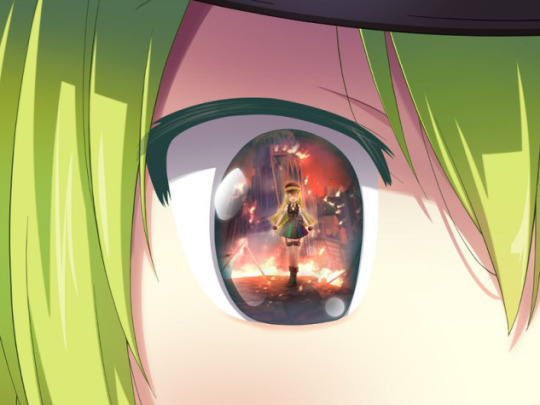
This is how she decided to become Holy Alina by wearing an Uwasa supposed to grant people their desires. And this is how Alina came to the conclusion she has to cause destruction, for the “sake” of humanity.

We might think that Alina’s actions actually came from a misguided good intention, but let’s not forget Alina is far from being a good person. She enjoys making people suffer and causing misery all around her, she doesn’t show any empathy for others and is remorseless. She’s sadistic, cruel and callous. And that lead to another diagnosis:
Antisocial Personality Disorder (ASPD).
In case you don’t know, ASPD is often referred to as sociopathy or psychopathy, even if both are technically incorrect, but let’s not dwell on that. Alina does exhibit a lot of antisocial behaviors, even before she became a magical girl, such as: Failure to obey laws and norms by engaging in behavior which results in criminal arrest, or would warrant criminal arrest, impulsive behaviors, irritability and aggression, disregard for her own safety and irresponsibility. She laters shows a blatant lack of remorse for her actions and a lack of empathy. The only traits she doesn’t seem to have is lying, deceiving and manipulating for her own profit or amusement. Alina is someone who is brutally honest and has no issue with speaking her mind and herself said that she doesn’t lie. I don’t recall any incident where Alina lies, but she can be deceiving and manipulative, like when she purposefully misled Madoka and Homura about Mami’s fate to hurt them, making it look like Mami met a gruesome death simply to make them suffer. But, ASPD can only be diagnosed when you’re 18 and alas, Alina is 16. But, there exists a precursor to ASPD for kids and teens, which is required to be diagnosed with ASPD: Conduct Disorder.
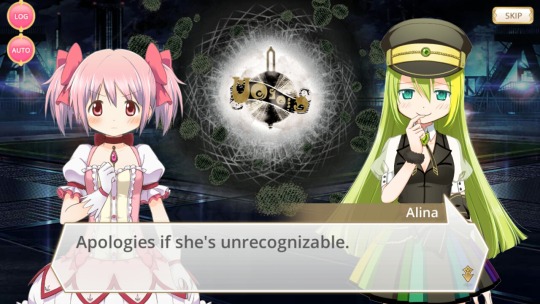


Alina almost fit the textbook criteria of conduct disorder. She’s a bully, aggressive, cruel towards others (and potentially animals), vandalism, deceptiveness and serious rules violation. And most of those were even before she became a magical girl. She often mistreats Karin and shows no respect for authority, she’s cruel towards others and I feel like it’s implied that Alina might have killed animals (and there’s also her reaction to Kyubey, who she thought was an animal and ended up kicking) and causes a lot of vandalism. Those were rather mild thoughts before she became a magical girl, where she’s downright dangerous and craving destruction.
BPD and ASPD both belong to the same cluster of personality disorder, cluster b, and are often comorbid. ASPD is often referred to as sociopathy, and given her borderline behaviors, Alina is pretty low-functioning. She’s impulsive, erratic and doesn’t bother to hide her true nature.
So, am I saying Alina is an irredeemable evil person who only seeks death and destruction? Yes, but no. There’s more to her. I won’t deny Alina’s cruelty and sadism and lack of concern for others well-being. After all, she doesn’t shy away from tormenting people, torture and attempted murder. But Alina isn’t born that way, she was driven to become a monster by the people around her. Alina wasn’t allowed to be a human, her feelings, desires and freedom were always disregarded, everything that makes someone human. Instead, she was treated like an object, an an object doesn’t have feelings and only serves a purpose. And the big tragedy in that is that Alina herself ended up objectifying herself. She decided to accomplish what she thinks humanity wants by causing destruction, but she’s also projecting her own self-destruction craving unto humanity as a whole. In the end, she tried to become the tool who will change the world for the good of humanity.
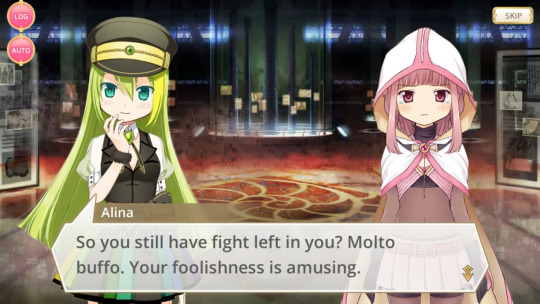
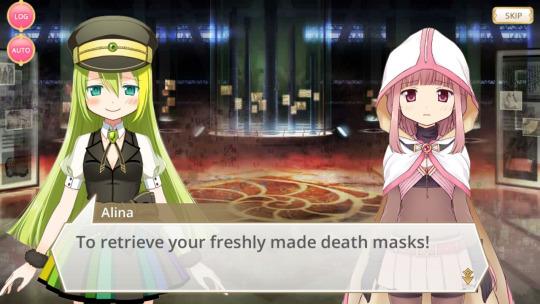
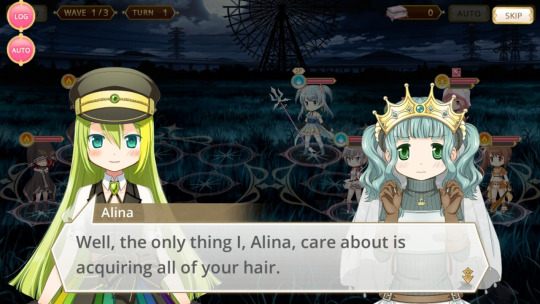
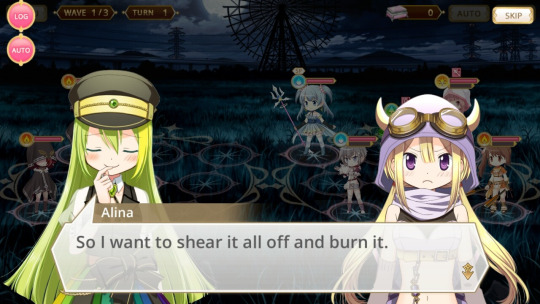
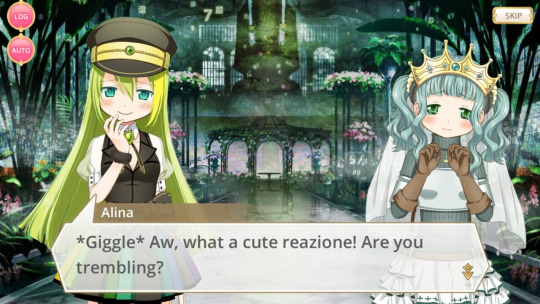
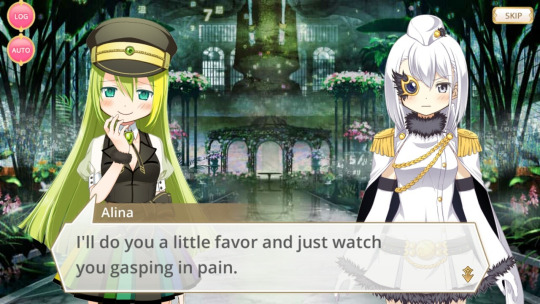
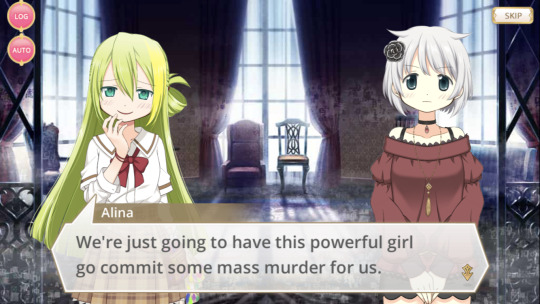
Being treated like an object made Alina unable to relate to others or understand their feelings, treating others just like she was treated: as objects. Alina seems to care for Mifuyu, but not as a person. Alina only values Mifuyu for her body, which she considers to be a work of art. Let’s not forget that magical girls’ true bodies are their soul gems and their human’s body is pretty much an empty shell, so Alina only caring for Mifuyu’s human body and not her as a person does show that she views Mifuyu as an object, not a person.
She also doesn’t understand humans’ bonds. When she proposed to spare their lives in exchange for Felicia (who she was angry at for destroying her witch), she didn’t understand why Tsuruno was so upset. Tsuruno even said “people aren’t objects!” which confused Alina even more. For Alina, everyone, including herself, are objects, and she herself can’t understand why others value people’s lives.
There’s also the way she’s treating witches. At first she seems to care about the witches she raised, considering like like pets and art and throwing a tantrum when Felicia destroyed one of them. But later in the story she shows no remorse to sacrifice the witches she raised, which shows that Alina doesn’t actually care for them, but given that they are hers, she can’t bear people other than her destroying them (or destroying them against her will). Alina did say that only an artist can destroy their own art. Given that she views the witches she raised and breed as her art, she doesn’t actually view them as actual pets but again, as objects. Alina’s objectification extend to witches too.
In one of the Christmas Events where she turned into Holy Alina, she ended up causing a lot of good actions while trying to do bad actions, which made people love her. But it didn’t please Alina at all. She doesn’t care about being loved or hated, she doesn’t care about what people think of her, good or bad actions. At some point, she noticed someone about to blow off a bomb and didn’t care nor show any interest in stopping him until she realized the bomb could damage Mifuyu’s body (again, she wasn’t worried for Mifuyu’s well-being, just her body). Alina seems to not feel shame for her behaviors, neither find it rewarding to be loved and praised.

Another thing regarding Mifuyu. At some point, the Magius (so Alina too) decided to sacrifice Mifuyu and feed her soul gem to Eve. I found it strange that Alina seemed to agree, until I realized something: A magical true body is their soul gem and they only need to feed that to Eve. There’s no need to feed Eve with their empty shell of an organic body. So I came to the conclusion that Alina didn’t mind sacrificing Mifuyu’s soul gem as long as she can keep her body. It just shows how much Alina doesn’t care about Mifuyu as a person and only valued her as a piece of art. An object. (And God knows what she would have done with her corpse).
Well, I’m not making a case about Alina not being an unredeemable piece of shit huh? Well, I decided to keep the best for the end: Her relationship with Karin.
It’s undeniable that Karin holds a special place in Alina’s heart (or whatever Alina has instead of a heart). Alina is cruel and mean towards Karin, true, but unlike other people, Alina never hurts Karin for her own pleasure or by sadism. Most of the time, she ended up mistreating Karin out of anger, mostly when she deemed that Karin made her lose her time or disappointed her, or when Karin is being dishonest with herself and doesn’t improve. Alina insults her and belittles her, as well as stealing her strawberry milk, not with the intention of hurting her, but as a form of punishment. Like a parent disciplining their child. But Alina does sincerely want Karin to improve and the fact that she takes the time to teach her, spend time with her and even rewards her proves that, in a way, Alina does care about Karin. In a really shitty and abusive way. But I don’t recall any instances where Alina physically harm Karin or show to enjoy hurting her. Still shitty and abusive, don’t get me wrong. But I feel like Alina is being abusive towards Karin because she’s unconsciously repeating how her parents may have treated her as a child. We know her parents often got angry at her and perhaps they acted in a way that is similar to how Alina treats Karin. The cycle of abuse sure is a tragic thing.
But why Karin? Well, I got a couple of theories. First, Karin is the only one who seems to care about Alina as a person and not an object. Karin greatly values Alina and is concerned about her feelings, something Alina isn’t used to, being only values for her talents. Karin often notices Alina’s change of mood and shows rejoice whenever Alina is in a good mood. She also worries greatly about Alina when she’s in a bad mood and even fear that she might try to commit suicide again. Karin is also someone who respects art and thrives to improve even if she seems to lack the talent. But she is still optimistic and never gives up, and she knows why she’s doing art. She wants to make people happy with her stories. Almost the opposite of Alina, who’s rather pessimistic, she oftens despaired regarding her art, she has the talent but lacks substance and doesn’t exactly know why she does art. Alina even admitted that Karin might be a bigger genius than her because of her passion, which Alina feels like she lacks, feeling empty inside. Even if Karin has expectations towards Alina, it doesn’t seem to put pressure on Alina, as Karin shows interest in how to make her own art and not Alina’s art itself. In a way, perhaps Alina can relate to Karin in a certain way, with her desire to make art, as well as being envious of how Karin can just be carefree about her art and be able to enjoy it without having people trying to use her. Perhaps this is why Alina is able to care about her, because in a way, she can relate to Karin. Still, Alina is abusive towards Karin and her intention doesn’t change how poorly she treats Karin.
Funny thing, Alina herself doesn’t seem to know exactly why she makes art, and ends up needing others’ opinions to figure it out. She ended up deducing that her core theme is self-destruction because of Touka and Nemu, which seems to make sense with Alina’s fascination with life and death. People focus on the death aspect, but Karin thinks that Alina’s works are actually full of life. Perhaps Karin is the one who’s right, maybe Alina’s actual core is more towards life, but given how twisted Alina became, she doesn’t even realize it herself. Maybe Karin is the only one who can see the good Alina might have deep down inside of her, or may even bring the good inside of her. Who knows, Karin might be the key for Alina potential redemption.
Also, it may not look like it, but I think Alina is constantly hurting inside, due to depression, but she’s so disconnected from her own feelings that she doesn’t realize it and unconsciously hurts others because she’s hurting. Alina is full of unhealthy coping. Her own fascination for life and death started by the death of her grandparents and dog when she was a kid, and might actually have traumatized her and her way to cope is her art. That would explain why Alina herself is uncertain about her theme, because often, understanding our own trauma can be quite hard, or even realize that we experience trauma in the first place. Perhaps death traumatized Alina and her art is her way to understand death better and accept it as a part of life itself. Maybe she actually wants to value life by understand death, because without death, life loses its core value.
So, did I answer the question? Is Alina a psycho crazy jojo villain? Yes, but no. Alina isn’t a psychopath and not downright psychotic either (even though she might experience psychotic episodes). Crazy? Well, I do think she suffers from personality disorders, but it doesn’t make her insane. A sociopath? Maaaybbeee. But to be honest, I mainly think Alina is someone broken who is the result of her environment, someone constantly hurting inside with deep self-destructive urges. The objectification made her feel disconnected from her feelings and humanity and turned her into a monster. But it doesn’t excuse her villainous actions, it only made them understandable and Alina more sympathetic.
Well that was longer than I expected. Let me know what you think and thanks for reading!
#magia record#alina gray#analysis#bordeline personality disorder#antisocial personality disorder#conduct disorder#sociopathy
147 notes
·
View notes
Text
No worries! ^^
Sherlock Holmes is NOT a sociopath
So I guess this one would also go in my “is NOT a psychopath” series, although in this case the misconception is Sherlock being a sociopath (antisocial personality disorder) rather than a psychopath. Let me just start by saying Sherlock is none of those, he doesn’t have ASPD, and let me tell you why.
Some might tell me “but Sherlock himself said he was a high-functioning sociopath, isn’t it canon?” and to that I’d reply: Since when a character saying something is necessarily canon? Characters can be wrong.
We saw it with Dexter Morgan, who is called a psychopath in the series but clearly isn’t one. Either the character is wrong, or the creator doesn’t know jack shit about what they are talking about. In Sherlock’s case, maybe it’s both but I won’t theorize on the matter and focus on why Sherlock doesn’t have ASPD.
The first criteria for ASPD is “ailure to obey laws and norms by engaging in behavior which results in criminal arrest, or would warrant criminal arrest”. Now, Sherlock defintely fail to obey norms and sometimes break the law, but most of the time, he cooperate with the police. He does consume drugs so yet, criminal behaviours, althought most addicts aren’t sociopaths.
The second criteria is lying, deception, and manipulation for profit or self-amusement. Most of the time, Sherlock is brutally honest. It happens that he lies for profit but rarely for amusement. This behaviour isn’t a big part of Sherlock’s personality and only do it when it’s necessary.
Then there’s impulsive behaviors. I wouldn’t say Sherlock is particularily impulsive, most of the time he’s calm and calculating, but yes, just like most people, it happens that he’s impulsive. But it doesn’t seem to be to the point it would be a problem.
Irritability and aggression, manifested as frequently assaults others, or engages in fighting: Frequent assault, not really. Sherlock do defend himself when needed however, as well as those he cares about. At some point he was yes excessively violent with someone, but it was because this person hurt his landlord. It’s not frequent and most of the time, justified by self-defense.
Blatantly disregards the safety of self and others: Okay, Sherlock does seem to have a certain disregards for his own safety, but not for others. Despite acting cold he does care for others safety and don’t tend to risk others life. On the contrary, most of the time he do all he can to save people.
Then there’s a pattern of irresponsibility. Sherlock is prideful and doesn’t like to admit when he’s wrong, but he does take his responsibilities and admit when he’s wrong. So there isn’t a pattern of irresponsibility.
Lack of remorse for actions: No. Not at all. We saw multiple time that Sherlock does have empathy and remorse. And not only for people close to him. He felt bad whenever he failed to save someone or someone died because of him.
So, even if Sherlock may slightly fit certain criteria, it’s not enough to qualify it a personality disorder. Antisocial behaviours? Yet. But not a personality disorder.
So why Sherlock claim to be a high-functioning sociopath? Well, either the creators are doing that for edgy points and don’t know what ASPD actually is, but I’ll give them the benefit of the doubt. My theory would be that Sherlock was allienated since he was a kid because he was different. We know that he does feel different when he got mad at Magnussen for “blackmailing people who are differents”. He feels abnormal and people make it look like he’s a cold monster, even referring to him as a “psychopath”. Perhaps Sherlock came to believe he truly is a sociopath because he view himself as uncaring and callous, or he says that as a way to excuse his behaviours or make sure people don’t come close to him. To me, it looks more like a defense mechanism.
To me, it’s more likely that Sherlock has Autistic Spectrum Disorder (either regular autism or Asperger Syndrome), but I’ll keep that for another analysis. This one was just to prove that he isn’t a sociopath.
26 notes
·
View notes
Text
As someone with ASD I do know, I was initially diagnosed with Asperger Syndrome before the diagnosis was changed. I did mention the right terminology and mention the old one because a lot of people aren’t aware of it.
Sherlock Holmes is NOT a sociopath
So I guess this one would also go in my “is NOT a psychopath” series, although in this case the misconception is Sherlock being a sociopath (antisocial personality disorder) rather than a psychopath. Let me just start by saying Sherlock is none of those, he doesn’t have ASPD, and let me tell you why.
Some might tell me “but Sherlock himself said he was a high-functioning sociopath, isn’t it canon?” and to that I’d reply: Since when a character saying something is necessarily canon? Characters can be wrong.
We saw it with Dexter Morgan, who is called a psychopath in the series but clearly isn’t one. Either the character is wrong, or the creator doesn’t know jack shit about what they are talking about. In Sherlock’s case, maybe it’s both but I won’t theorize on the matter and focus on why Sherlock doesn’t have ASPD.
The first criteria for ASPD is “ailure to obey laws and norms by engaging in behavior which results in criminal arrest, or would warrant criminal arrest”. Now, Sherlock defintely fail to obey norms and sometimes break the law, but most of the time, he cooperate with the police. He does consume drugs so yet, criminal behaviours, althought most addicts aren’t sociopaths.
The second criteria is lying, deception, and manipulation for profit or self-amusement. Most of the time, Sherlock is brutally honest. It happens that he lies for profit but rarely for amusement. This behaviour isn’t a big part of Sherlock’s personality and only do it when it’s necessary.
Then there’s impulsive behaviors. I wouldn’t say Sherlock is particularily impulsive, most of the time he’s calm and calculating, but yes, just like most people, it happens that he’s impulsive. But it doesn’t seem to be to the point it would be a problem.
Irritability and aggression, manifested as frequently assaults others, or engages in fighting: Frequent assault, not really. Sherlock do defend himself when needed however, as well as those he cares about. At some point he was yes excessively violent with someone, but it was because this person hurt his landlord. It’s not frequent and most of the time, justified by self-defense.
Blatantly disregards the safety of self and others: Okay, Sherlock does seem to have a certain disregards for his own safety, but not for others. Despite acting cold he does care for others safety and don’t tend to risk others life. On the contrary, most of the time he do all he can to save people.
Then there’s a pattern of irresponsibility. Sherlock is prideful and doesn’t like to admit when he’s wrong, but he does take his responsibilities and admit when he’s wrong. So there isn’t a pattern of irresponsibility.
Lack of remorse for actions: No. Not at all. We saw multiple time that Sherlock does have empathy and remorse. And not only for people close to him. He felt bad whenever he failed to save someone or someone died because of him.
So, even if Sherlock may slightly fit certain criteria, it’s not enough to qualify it a personality disorder. Antisocial behaviours? Yet. But not a personality disorder.
So why Sherlock claim to be a high-functioning sociopath? Well, either the creators are doing that for edgy points and don’t know what ASPD actually is, but I’ll give them the benefit of the doubt. My theory would be that Sherlock was allienated since he was a kid because he was different. We know that he does feel different when he got mad at Magnussen for “blackmailing people who are differents”. He feels abnormal and people make it look like he’s a cold monster, even referring to him as a “psychopath”. Perhaps Sherlock came to believe he truly is a sociopath because he view himself as uncaring and callous, or he says that as a way to excuse his behaviours or make sure people don’t come close to him. To me, it looks more like a defense mechanism.
To me, it’s more likely that Sherlock has Autistic Spectrum Disorder (either regular autism or Asperger Syndrome), but I’ll keep that for another analysis. This one was just to prove that he isn’t a sociopath.
26 notes
·
View notes
Text
Sherlock Holmes is NOT a sociopath
So I guess this one would also go in my “is NOT a psychopath” series, although in this case the misconception is Sherlock being a sociopath (antisocial personality disorder) rather than a psychopath. Let me just start by saying Sherlock is none of those, he doesn’t have ASPD, and let me tell you why.
Some might tell me “but Sherlock himself said he was a high-functioning sociopath, isn’t it canon?” and to that I’d reply: Since when a character saying something is necessarily canon? Characters can be wrong.
We saw it with Dexter Morgan, who is called a psychopath in the series but clearly isn’t one. Either the character is wrong, or the creator doesn’t know jack shit about what they are talking about. In Sherlock’s case, maybe it’s both but I won’t theorize on the matter and focus on why Sherlock doesn’t have ASPD.
The first criteria for ASPD is “ailure to obey laws and norms by engaging in behavior which results in criminal arrest, or would warrant criminal arrest”. Now, Sherlock defintely fail to obey norms and sometimes break the law, but most of the time, he cooperate with the police. He does consume drugs so yet, criminal behaviours, althought most addicts aren’t sociopaths.
The second criteria is lying, deception, and manipulation for profit or self-amusement. Most of the time, Sherlock is brutally honest. It happens that he lies for profit but rarely for amusement. This behaviour isn’t a big part of Sherlock’s personality and only do it when it’s necessary.
Then there’s impulsive behaviors. I wouldn’t say Sherlock is particularily impulsive, most of the time he’s calm and calculating, but yes, just like most people, it happens that he’s impulsive. But it doesn’t seem to be to the point it would be a problem.
Irritability and aggression, manifested as frequently assaults others, or engages in fighting: Frequent assault, not really. Sherlock do defend himself when needed however, as well as those he cares about. At some point he was yes excessively violent with someone, but it was because this person hurt his landlord. It’s not frequent and most of the time, justified by self-defense.
Blatantly disregards the safety of self and others: Okay, Sherlock does seem to have a certain disregards for his own safety, but not for others. Despite acting cold he does care for others safety and don’t tend to risk others life. On the contrary, most of the time he do all he can to save people.
Then there’s a pattern of irresponsibility. Sherlock is prideful and doesn’t like to admit when he’s wrong, but he does take his responsibilities and admit when he’s wrong. So there isn’t a pattern of irresponsibility.
Lack of remorse for actions: No. Not at all. We saw multiple time that Sherlock does have empathy and remorse. And not only for people close to him. He felt bad whenever he failed to save someone or someone died because of him.
So, even if Sherlock may slightly fit certain criteria, it’s not enough to qualify it a personality disorder. Antisocial behaviours? Yet. But not a personality disorder.
So why Sherlock claim to be a high-functioning sociopath? Well, either the creators are doing that for edgy points and don’t know what ASPD actually is, but I’ll give them the benefit of the doubt. My theory would be that Sherlock was allienated since he was a kid because he was different. We know that he does feel different when he got mad at Magnussen for “blackmailing people who are differents”. He feels abnormal and people make it look like he’s a cold monster, even referring to him as a “psychopath”. Perhaps Sherlock came to believe he truly is a sociopath because he view himself as uncaring and callous, or he says that as a way to excuse his behaviours or make sure people don’t come close to him. To me, it looks more like a defense mechanism.
To me, it’s more likely that Sherlock has Autistic Spectrum Disorder (either regular autism or Asperger Syndrome), but I’ll keep that for another analysis. This one was just to prove that he isn’t a sociopath.
#sherlock holmes#sherlock (2010)#sherlock bbc#sociopath#is not a psychopath#well in this case is not a sociopath
26 notes
·
View notes
Text
^
i just read an amazing analysis of Villanelle’s character this season that was left as a reply on this sneak peek for 3x05 and i want to show it to you guys
the original comment was this:

and then some angel typed out this banger of a response

whoever u are, thank you
467 notes
·
View notes
Text
Psychopathy vs Antisocial Personality Disorder
Given the title of this post it’s obvious what I’m going to be discussing: The differences between psychopathy and antisocial personality disorder (ASPD). A lot of people tend to confuse those two or think they are synonymous, as well as sociopath. I’ll start by given the definition for each of those as well as other similar condition.
Primary Psychopathy: Most commonly referred as psychopathy. When specialists talk about psychopaths, most of the time they mean those who have primary psychopathy. Primary psychopathy is innate, meaning that primary psychopaths are born that way. Primary psychopathy is characterized by callousness, shallow affect, manipulation, and superficial charm. Not all primary psychopaths have antisocial personality disorder. They all have certain narcissistic traits (such as grandiose) but again, not all primary psychopaths could be diagnosed with narcissistic personality disorder either. Primary psychopaths have a defecting empathy, meaning that they can’t and will never feel empathy. They are usually viewed as high-functioning.
Secondary Psychopathy: Usually referred to as sociopathy, even tho the term sociopath is outdated. Secondary psychopaths are made, they have been mold that way by their environment and possible trauma. Secondary psychopathy is associated with impulsivity and lack of long-term goals, and is related to hostile behaviors. Unlike primary psychopaths, secondary psychopaths are often emotionally unstable and can experience guilt and empathy. Their empathy isn’t defective but instead dysfunctional. All secondary psychopaths meet the criteria for antisocial personality disorder and they are more likely to also have borderline personality disorder. They are also more likely to be low-functioning.
Antisocial Personality Disorder: Also often used as a synonyme of sociopathy. The criteria are failure to obey laws and norms, lying, deception, and manipulation for profit or self-amusement, impulsive behavior, irritability and aggression, blatantly disregards the safety of self and others, a pattern of irresponsibility and lack of remorse. The person needs to be at least 18, have conduct behavior before 15 and the antisocial behaviors aren’t related to schizophrenia or bipolar disorder. People with ASPD can feel empathy and love towards those they bond with and their level of functioning depends of their IQ, education and environment.
Conduct Disorder: Considered the precursor of ASPD. Conduct disorder is characterized by antisocial behaviors in children and teenagers. The causes can be diverse, such as genetic, environment or even a low IQ. The signs of conduct disorder are bullying, aggressiveness, use of weapons, cruelty (towards humans or animals), stealing, forced sexual activities, vandalism, deceptiveness and serious rule violation. Whether those issues are treated or not can determine if those antisocial behaviors will continue in adulthood (and become ASPD) or not.
Narcissistic Personality Disorder: NPD is a personality disorder from Cluster B like ASPD. To be diagnosed with NPD you need to have at least 5 of the 9 following criteria: grandiose sense of self-importance, fantasies of unlimited success, power, brilliance, beauty, or ideal love, think they are "special" and unique and can only be understood by, or should associate with, other special or high-status people, requires excessive admiration, has a sense of entitlement, is interpersonally exploitative, lack of empathy, is often envious of others or believes that others are envious of them and shows arrogant, haughty behaviors or attitudes. The exact cause of NPD is uncertain but specialist are led to believe it might be a combinaison of genetics and environments.
Bordeline Personality Disorder: BPD is another personality disorder from the Cluster B. Its characterized by markedly disturbed sense of identity, frantic efforts to avoid real or imagined abandonment and extreme reactions to such, black and white thinking, impulsivity, intense or uncontrollable emotional reactions that are disproportionate to the event or situation, unstable and chaotic interpersonal relationships, distorded self-image, self-damaging behaviors, dissociation and is often accompanied by depression, anxiety, anger, substance abuse, or rage.
Histrionic Personality Disorder: The last personality disorder from Cluster B. HPD is a personality disorder characterized by a pattern of excessive attention-seeking behaviors, usually beginning in early adulthood, including inappropriate seduction and an excessive need for approval. People diagnosed with the disorder are said to be lively, dramatic, vivacious, enthusiastic, and flirtatious. People with HPD are usually high-functioning, both socially and professionally. They usually have good social skills, despite tending to use them to manipulate others into making them the center of attention. HPD may also affect a person's social and romantic relationships, as well as their ability to cope with losses or failures.
Phew. Now that we got over all the definition, let’s see what differienciate them. Most of those conditions are mainly related to the environment with maybe some genetics component, except primary psychopathy which is 100% genetics. Primary psychopathy and HPD are largely high-functioning, secondary psychoapthy and BPD are often low-functioning while ASPD and NPD it varies. Most of those conditions share similar traits such as a lack of empathy and manipulative tendencis. But they are also largely different on many aspects.
You may wonder why I didn’t mention sociopathy. Well, sociopaths is considered as an outdated term that was previously used as synonymous of either secondary psychopathy or ASPD. So to avoid confusing those two I’ll void using sociopathy.
You may have seen videos of “psychopaths vs sociopaths” and most of them are actually comparing primary psychopathy and secondary psychopathy. They do share similarity such as a lack of remorse, pathological liar, manipulative, irresponsability, disregard for others and a failure to learn from mistakes. But, primary psychopaths tend to be more emotionally shallow, calculating and calm while secondary psychopaths are neurotics, anxious, impulsivity and can actually feel love, guilt and empathy. Primary psychopaths are often known as corporate psychopaths or successful psychopaths and tend to have higher jobs such as CEO, lawyer, salesperson, surgeon, journalist, police officer, clergy, chef and civil servant. Secondary psychopaths on the contrary tend to struggle with keeping jobs and often have low education. Primary psychopaths are part of the narcissistic personalities but not all of them would qualify as an actual narcissist. Even if primary psychopathy and ASPD shares some traits, not all primary psychopaths have ASPD. Secondary psychopaths also have narcissitic traits and antisocial traits and are more likely to have BPD.
Here’s an interesting diagram to illustrate this:

This diagram, however, is really male-centric. ASPD is more common in male psychopaths, while HPD is more common among female psychopaths. Even for non-psychopathic people, ASPD is more common among men and HPD among women. I don’t think it’s due to biological differences, more because of how men and women are raised in society (aggresivity is encouraged for boys while girls are encouraged to be more passive). So personally, I’d add HPD to this diagram.
You may have heard the saying “all psychopaths are sociopaths but not all sociopaths are psychopaths” or that psychopathy is a more severe for of sociopathy. Even if there’s some sense in that, it’s factually wrong. Primary psychopathy and secondary psychopathy are mutually exclusive, but if in this sentence sociopathy means ASPD, then I understand where it came from. For a long time psychopathy was viewed as a form of ASPD, therefore, if ASPD is sociopathy and all psychopaths have ASPD, then by logic, all psychopaths would be sociopaths too. But we know now that not all primary psychopaths have ASPD so therefore, the statement is incorrect. But, psychopathy and ASPD are often comorbid and do shares a lot of similarities.
Important thing to note, to be diagnosed with ASPD you need to be over 18 and have previously show signs of conduct disorder before the age of 15. Such requirements don’t exist for primary psychopathy, given that CD is a precursor for ASPD and not all primary psychopaths have ASPD.
I want to precise that even if there’s a large percentage of criminals with ASPD. In a study it showed that around 35.3% (either men or women) prisoners met the criteria for ASPD and around 15% to 25% of men in prisons who are psychopaths. Psychopaths make up 1% of the population while around 3% to 4% of the population are diagnosed with ASPD. Despite that, most psychopaths or people with ASPD aren’t criminals.
I want to finish that saying I’m no professional, I did studied psychology on my own for years but I wouldn’t pretend to be an expert. All I said are based on medical sources I read, which I’ll link bellow. Thanks for reading and don’t hesitate to let me know your thoughts.
Psychopaths in prison
Prisoners with ASPD
Primary Psychopathy vs Secondary Psychopathy
Female psychopaths and HPD
Secondary Psychopathy and BPD
#psychopathy#primary psychopathy#secondary psychopathy#psychopath#antisocial personality disorder#ASPD#conduct disorder#bordeline personality disorder#narcissistic personality disorder#histrionic personality disorder#sociopath#sociopathy
18 notes
·
View notes
Text
Villanelle (TV Show) is NOT a psychopath
I know what you’re thinking. “But Villanelle is refered as a psychopath in both the show and the synopsis”. Well, either the characters withing the show were wrongs, or the show itself did a poor job at writing an actual psychopath, because Villanelle really isn’t one. I just want to precise that I’m talking about Villanelle in Killing Eve the TV Show, not Villanelle in the book Codename Villanelle, who I believe is a more accurate psychopath.
So, when I was watching the first season I initially thought that perhaps yes, she was an actual psychopath. But then later we met her ex-crush (who if I remember correctly Villanelle eventually kill) and seems to express genuine sadness and regret over that, which is pointed out by Konstatine’s daughter. Her whole interaction with the daughter also show her as really impulsive and emotional and that’s when I started to have doubt. Then in season 2, Villanelle expressed fear over ghosts and even got startled when she thought she met one. Villanelle isn’t immune to stress and fear, which should be impossible for a psychopath. But at that point, I was more “maybe she’s still a psychopath and the show just didn’t know about those details”.
Then season 3 arrived. Villanelle meet back with her biological family and we learned that her mother was abusive towards her as a child. Upon meeting with her half-brother, Villanelle realized that her mother is being abusive towards him now and she seems genuinly upset. She confronted her mother, who deny it by pretending that Villanelle was born like that, while actually, her mother made her that way. Villanelle eventually deal with her past trauma in the only way she knows: by killing her mother. But, surprisignly, she decides to spare her younger brother and even give him money to realize his dream. It seemed that Villanelle did feel bad for him and perhaps even genuine empathy for the first time in her life.
This experience left a deep mark in her and she even wanted to stop being an assassin. My guess is that her need to kill was a way to cope with her anger towards her mom, but now that she killed her, she knows it would be pointless to continue. I don’t think she regrets her actions per se, more that she realized how pointless they were and that in the end, it didn’t help her.
I believe that this experience of feeling sympathy for someone is what helped Villanelle understand her feelings towards Eve and actually care for her instead of just using her. This is why during the bridge scene, she was ready to leave Eve for her own good, because she knew she was bad for Eve. I also believe that the reason why Villanelle was upset when Eve called her a psychopath is because it would mean her mother was right and that she was born that way.
So no, Villanelle isn’t a psychopath. She wasn’t born that way, she was made that way. I do think however that she qualify as a sociopath, but that will be for another post.
116 notes
·
View notes
Text
Oh Sangwoo is NOT a psychopath
I guess I’ll turn the “_is NOT a psychopath” into a series. After Joe Goldberg and Dexter Morgan, times to explain why Sangwoo (Killing Stalking) isn’t a psychopath.
First, as I have said many times, psychopaths are born that way. Judging by the flashbacks, Sangwoo wasn’t always a remorsless and sadistic killer. He was a pretty normal kid who was stuck with pretty abusive parents (especially his mother). His mother even tried to murder him as a child because of how possessive she was of her husband. This started her husband to be abusive towards her and become alcoholic, eventually abusive both his wife and child. Sangwoo’s mom was also regularily humiliating his son. She eventually murdered her husband and put the blame on Sangwoo, who believed that he indeed killed his father. After this, his mother started to treat him like her husband, flirting with him and poisoning him. And one day, she attempted to rape him, before killing herself on the knife Sangwoo was holding, giving him the feeling he murdered her. All of this is what broke Sangwoo’s mind.
Sangwoo isn’t born that way, he was made by his environment, upbringing and trauma. Therefore, instead of being a psychopath, he would be a sociopath. But, usually, sociopaths are considered to be more impulsive and less organized, while Sangwoo can have a lot of self-control and thoroughly plan his murders. Sangwoo would be what we call a “high-functioning sociopath” who have control over his impulse and can blend into society. But, the trauma seems to also cause him psychotic tendencies and, the more he is with Bum (who reminds him of his mother), the more unstable and insane he became, thus less and less functioning throughout the series. So he started as a high-functioning sociopath and ended up a psychotic low/mid-functioning sociopath. I may do an actual analysis of him eventually.
13 notes
·
View notes
Text
Dexter Morgan is NOT a psychopath
After my post Joe Goldberg is NOT a psychopath, I guess I’ll make another one debunking one of the most known “psychopath” in TV history: Dexter Morgan. Some of you may think that I’m wrong because in last season he was describe as one, therefore he’s a “canon psychopath”. I could argue that the creators had no idea what true psychopathy is, but it could also be the characters in the show that showed some biases. But before talking about that, let’s just debunk the misconception that Dexter is a psychopath.
Dexter is introduced in the show as someone who can’t feel emotion, asocial, a little bit socially awkward and with murderous pulsion. He’s a vigilante serial killer who only kills murderer to satisfy his thirst for blood, following his code given by his adoptive father. Yet, even through season one, we can see that Dexter isn’t devoid of empathy. He genuinly cares for his adoptive sister and does feel bad when he kills his biological brother.
Psychopaths are born that way. They are incapable of empathy or remorse and never will. Those facts alone completely discriditate Dexter as a psychopath. The whole series is about a suposedly cold and emotionless man who through the seasons, become more and more human as he bonds with others and experience emotions. He genuinly loved his wife Rita, his childrens, his sister, his family. He showed empathy and remorse countless time throughout the series. Dexter wasn’t born like that, he became like that due to trauma to see his mother getting brutally killed. His murderous desire are his way to cope with trauma.
If I had to give a diagnosis, I would say Dexter suffers from PTSD, schizoid personality disorder and maybe have autism.
Now the big part. Dexter was called a psychopath in last season. We learned that Dexter’s adoptive father saw a doctor when Dexter was a teen because of Dexter’s disturbing behaviours. The doctor suspected Dexter to be a psychopath and is basically the one who convinced his father to condition him to become a vigilanty serial killer. An interesting scene that happened between Dexter, Debra and the doctor was when the siblings mention how much they care for each other, which the doctor seemed confused and said “psychopath can’t love”. It makes me think that it’s not the creators of the show who made a mistake, it’s the doctor herself who misdiagnosed Dexter as a psychopath.
If you want a good example of a psychopath in Dexter, Oliver Saxon is probably the best example. Dexter? Not so much, In the book however, he could be considered a sociopath.
39 notes
·
View notes
Link
Server to talk about the psychology of psychopaths/sociopaths and other comorbid/similar disorders, as well as analysing fictional characters. If you think psychopaths = crazy killers or you're a edgy self-diagnosed psychopath who think it's cool to have a mental disorder, this isn't the right place for you.
Server co-created with @joker-of-gotham
Looking forward to chat with other psychopaths enthusiasts!
#psychopath#psychopathy#sociopath#sociopathy#antisocial personality disorder#anti-social personality disorder#aspd#apd#psychology#psychiatry#psychopathist#narcissism#narcissistic personality disorder#npd#serial killer#analysis#discord
9 notes
·
View notes